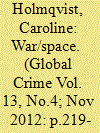|
|
|
Sort Order |
|
|
|
Items / Page
|
|
|
|
|
|
|
| Srl | Item |
| 1 |
ID:
059994


|
|
|
|
|
| Publication |
Solna, Stockholm International Peace Research Institute (Sipri), 2005.
|
| Description |
vi, 59p.
|
|
|
|
|
|
|
|
|
|
|
|
Copies: C:1/I:0,R:0,Q:0
Circulation
| Accession# | Call# | Current Location | Status | Policy | Location |
| 049305 | 363.289/HOL 049305 | Main | On Shelf | General | |
|
|
|
|
| 2 |
ID:
123586


|
|
|
|
|
| Publication |
2013.
|
| Summary/Abstract |
The turn to military robotics is a striking feature of contemporary Western warfare. How then to make sense of the increasing reliance on unmanned weapons systems, in particular, the use of combat-enabled Unmanned Aerial Vehicles/drones? Questioning the intuitive and oft-repeated claim that robotics 'take the human experience out of war' (reducing it to a video game), I argue that in order to make sense of current developments, we need precisely to reconsider our understanding of the human, her role in, and experience of, war. In this, we are aided by a critical materialist inquiry that investigates the human-material assemblage as a complex whole, taking both fleshy and steely bodies into account. Drawing on the philosophies of Maurice Merleau-Ponty and Judith Butler, I show that only by considering what being human means - in ontological terms - and by asking how human experience is altered through new technologies will we be able to think politically and ethically about contemporary war.
|
|
|
|
|
|
|
|
|
|
|
|
|
|
|
|
| 3 |
ID:
126064


|
|
|
|
|
| Publication |
2013.
|
| Summary/Abstract |
Contemporary Western war-fighting is animated by the fictitious imagination of a war free from antagonism. In this logic, winning wars is about winning the 'hearts and minds' of local populations, about persuasion rather than confrontation. In recent years, the concept of 'strategic communication' (SC) has been elevated to the top echelons of strategic thinking in United States military circles, focusing attention on how to communicate 'effectively' with local populations. Via an analysis of the concept of SC, this article examines the ethico-political dimensions of contemporary Western-led 'population-centric' war. Through a reading inspired by Judith Butler's recent work in Precarious life (London: Verso 2006) and Frames of war (London: Verso 2009), and an analysis that turns on the link between ethics and ontology, I reflect on the significance of the 'communications turn' in warfare for our study of war in ontological terms.
|
|
|
|
|
|
|
|
|
|
|
|
|
|
|
|
| 4 |
ID:
116126


|
|
|
|
|
| Publication |
2012.
|
| Summary/Abstract |
Understandings of war - its shape, form, character and content - are conditioned by conceptualisations and narratives of social and political space. As such, the history of writing on war is also a history of spatiality, expressed through a particular circumstance and practice. Through analysis of early modern conceptualisations of space, politics and war, this article considers the shift in political spatiality associated with the demise of modern linear spatiality that firmly established the territorial state as site of politics and war. The central argument of this article is that contemporary accounts of war reveal a political spatiality in flux coupled with an insistence on the global, such that many accounts of war neglect its political content. Three key accounts of contemporary war are engaged: liberal discourses of war as 'policing'; accounts of war as 'biopolitical empire'; and discourses of war as 'risk management' - all found, in different ways and collectively, to disregard the political confrontation that war necessarily entails.
|
|
|
|
|
|
|
|
|
|
|
|
|
|
|
|
|
|
|
|
|